Riding The Negative Waves Of Dystopian Fiction
“There you go, more negative waves!”
– Oddball, Kelley’s Heroes
Anyone notice the glut of dystopian fiction these days?
“Now wait a minute there, tech-boy,” you say. “Haven’t you written a few dystopian novels yourself?”
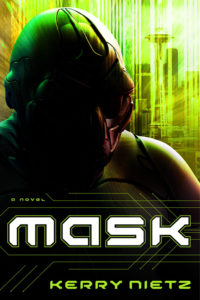 Um…well…yes, I have. A total of four, actually. But even if I wasn’t writing them, I’d still have to notice the trend. As a Vine reviewer for Amazon, four out of the last five sci-fi books I’ve reviewed have been straight dystopia. Or, to quote the Webster’s definition, they were all novels that featured “an imaginary place where people lead dehumanized and often fearful lives.”
Um…well…yes, I have. A total of four, actually. But even if I wasn’t writing them, I’d still have to notice the trend. As a Vine reviewer for Amazon, four out of the last five sci-fi books I’ve reviewed have been straight dystopia. Or, to quote the Webster’s definition, they were all novels that featured “an imaginary place where people lead dehumanized and often fearful lives.”
Given all the dystopian novels out there, one might think that publishers were actively seeking such stories. Well, they are! In fact, according to an author friend even larger CBA publishers are looking for novels with a dystopian slant.
Part of that is doubtless do to the film and book juggernaut that is “The Hunger Games.” But even the worlds of our superheroes (Superman and Batman, for instance) have a markedly dystopian feel now. So why is that? Why, when by most secular measures—human longevity, general prosperity, amount of leisure time—this present world is most utopian of any generation, do we find ourselves, in literature, so invested in future shadows?
Let me offer three suggestions as to why…
History
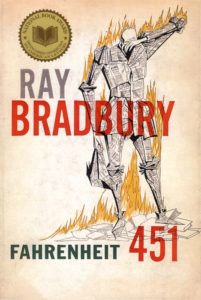 Those of us who grew up in the sixties and seventies, were exposed to a wealth of dystopian novels and films. There’s the bubble cities of Logan’s Run where one’s life is literally “in the palm of their hands,” and the overpopulated world of Soylent Green. There’s the totalitarian government of Orwell’s classic 1984 and the overstimulated population of Huxley’s Brave New World.
Those of us who grew up in the sixties and seventies, were exposed to a wealth of dystopian novels and films. There’s the bubble cities of Logan’s Run where one’s life is literally “in the palm of their hands,” and the overpopulated world of Soylent Green. There’s the totalitarian government of Orwell’s classic 1984 and the overstimulated population of Huxley’s Brave New World.
And let’s not forget the firemen of Bradbury’s Fahrenheit 451 or the simian rule of The Planet of the Apes!
Such dystopian seeds can’t help but be expressed in the literary preferences of today. We grew up reading and watching it, and now not only are many of us still reading it, but some are writing it too. My novel Mask pays homage to some of those sci-fi classics.
Literary usefulness
Another reason I think dystopian novels have such a renewed interest is due to their literary usefulness. Dystopias are a great way to put ideas in a test kitchen. Just take a popular trend or fear, extrapolate it out to its extreme (and sometimes logical) conclusion, and you have a dystopia.
People censoring books today? Hmm…so what if all books were censored tomorrow? Wa-poof. Fahrenheit 451.
What if the earth became overpopulated? Solyent Green.
What if the earth became overpopulated, and there was a massive war? Logan’s Run.
What if today’s commercialism and selfishness one day dominates society? Brave New World.
And a couple personal favorites:
 What if the whole world was under sharia law? The DarkTrench Saga.
What if the whole world was under sharia law? The DarkTrench Saga.
What if people could vote on anything or anyone? Mask.
See how easy that was? Ray Bradbury once said: “I write not to predict the future, but to prevent it.” For an author, dystopias are an excellent way to explore relevant issues while preserving a level of abstraction that makes the subject approachable to everyone. A way to raise a warning flag about a potential danger ahead without preaching. (Show of hands, how many people think freedom of speech and the press are safer for Bradbury’s having shown what life would be like if they were not?)
For the reader, dystopian novels provide a forum to examine worst case scenarios. A magnifying glass he can hold up to the real world to see if there is something there to be truly wary of. Will we ever see children fighting to the death in an arena, a la The Hunger Games? Probably not. But is the value of children and childhood being diminished before our eyes? Absolutely. Now, what can we do about it?
Our collective dread
The last reason I think dystopian novels are so popular is because, regardless of whether life today is better than it was centuries ago, we also sense—collectively—that a free society is a very fragile thing. History proves it. There were few steps between the federal republic of Weimar, and the totalitarian regime of Hitler. Only two isolated revolutions were enough to end the dynasty of the Czars and spur the beginning of the Soviet Union. Whatever freedoms we enjoy, whatever blessings, need to be diligently protected and preserved. Because is the totality of history, they are but a whisper.
In addition, I think we all sense that no matter how good things are here, they aren’t as good as they should be. This is a manifestation of the longing for Heaven that humans innately have. We seek comfort, we seek happiness. We find ourselves upset over the smallest detail — the simplest event that didn’t go our way.
Doesn’t that suggest that we’re all living in a dystopia now?
Well, in respects to Heaven, yes we are.
Now it’s your turn. Why do you think dystopias are so popular?
































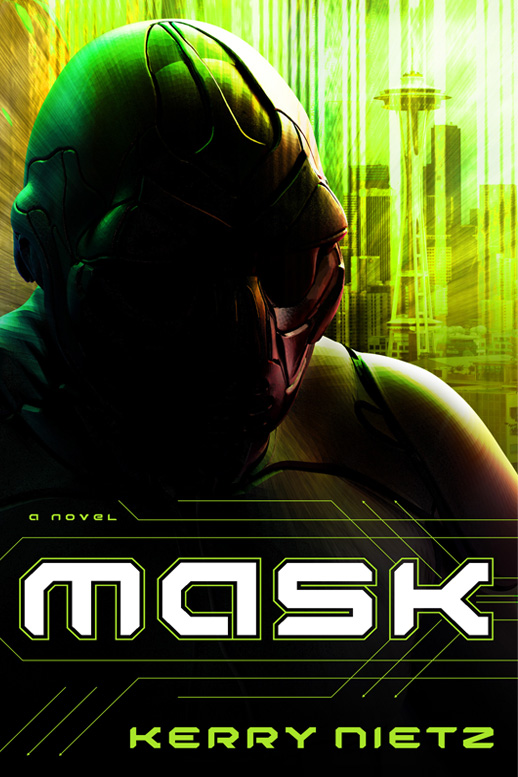
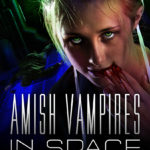
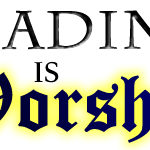





The most obvious answer is that stories are about conflict, and a dystopian setting provides an easy way to ratchet up the suspense and keep the reader reading. But that’s a surface answer so I’m glad you went another direction. I enjoyed the article, thanks.
Jon
That’s true too, Jon. Another way it is literarily useful. Good point. Thanks for stopping by!
It’s possible there’s a “bread and circus” element to the appeal of dystopian stories. I have done no research on other cultures’ responses to the flood of post-apocalyptic entertainment (especially censored or oppressed ones), but there does come a point in the fall of a society where violence becomes a normal part of entertainment. In a morally numb environment, artificial extremes must be created in order to push the spectators into feeling terror, joy, etc.
There is probably an element of truth to that too, Lex. Hmm…you got me thinking. Thanks for that.
I think part of the appeal is because young people do not think the world is going to get better. We’re aware of so much more now–mostly bad things–than we ever were before, and it’s overwhelming.
To counterpoint, Galadriel, it is easy to focus on the negative today. And our media is geared toward it. Negative headlines bring more clicks. 🙂 But just think what the headlines would’ve been in the Middle Ages: “Black Plague takes whole village!”, “Twenty burnt at the stake today!”, “Sewage catches fire!” etc…
For a while I’ve thought that The Hunger Games and some (not all) “dystopian” novels may “cheat” somewhat. These warn of possible negative futures for societies that indulge in dehumanization and violence — while also presenting such violence.
Make no mistake; I don’t say this to criticize. I’m sure that, for example, Hunger Games author Suzanne Collins does not mean to glorify violence. Yet that attraction is there, and I feel it’s a way to “trap” readers who come for the violence and leave more challenged to reject it. Other readers, however, leave without hearing the real theme — and of course some make “survive the arena”-style “reality” TV and miss the point.
Personally, I am more inclined to trust a dystopian story than a utopian one. Portraying a perfect society is a task that no author is really qualified to do, I think. To do so convincingly would probably require a special dispensation. As much as I respect and enjoy the Star Trek franchise, the supposed utopia is ridiculous and seriously hurts the believability of the worldbuilding and the plot. Other space opera television shows like Battlestar Galactica and Babylon 5 are much more believable because they are more pessimistic about humanity.
How is dystopian strictly defined? It seem like it is always a subgenre, usually of science fiction. (Although Sanderson’s Mistborn is high fantasy distopia.) It seems that there is a spectrum. On one end, dystopia blends into post-apocalyptic. On the other, there is simply a strongly negative outlook on human society.
I really need to read those classic dystopias some day. I enjoyed this post.
Yes, you should read those classics, Bainespal. Start with Farhenheit 451. It is a quick read, and is Bradbury at his poetic best. Logan’s Run is fun, and the book version of Planet of the Apes is really good, and has a different twist than the movie version.
Thanks for stopping by!
I think the reason dystopias are for the reasons Kerry Nietz said, in a way, we can see where are world is going through them. The represent where things are going wrong and the future we could have.
Thanks for posting, Rachel. Appreciate it!
Thanks for this post. I enjoyed your take on the popularity of dystopians. It’s true that they have great literary usefulness. Tension is inherent in a dystopian society which helps when an author is striving for “tension on every page.” But underneath the dread, need, and societal conscientiousness, I think dystopian novels have a great capacity to affirm life and hope.
I had a conversation with a friend about Hunger Games in which she gave me a hard time for my “Team Peeta” stance. She said something to the affect of “Why can’t Katniss just be a strong heroine without the love story being central?” My response was that all of Katniss’ strength would be meaningless without the character of Peeta, who represents all that’s good and worth fighting for. Yes, maybe that’s cheesy, but it’s true that we always need something to root for. So even though the genre is labeled by some as dark and depressing, I think it’s possible to write a dystopian novel from and optimistic standpoint. But maybe that’s just me.
I completely agree. The romance in Hunger Games has a specific role to play in the growth of Katniss. It’s not just another teen triangle added to give the book “emotional tension,” though the whole “team Gale/Peeta” thing makes it seem more like it, as if they are sort of two options that are about the same. Really, they represent the two ways Katniss could go – either the hatred and bitterness of Gale, or the selfless forgiveness of Peeta.
That’s really the heart of the books, and it really comes out in Mockingjay when Peeta is stripped of his memories, taking away all the mushy heart reasons he would put others, namely Katniss first. In that situtation, he is still willing to give his life to save the lives of his compainons, showing what his heart is really made of. On the other side, what is in Gale’s heart is also revealed, and Katniss recognizes the difference between the two guys, and chooses the one she wants to be, rather than the one who echoes the darkest parts of her own heart.
Yes, Evangeline, I think without a glimmer of light, a dystopian novel would be hard to read and write. 1984 comes to mind. Great story, and I think it has the effect the author intended…but wow, dark.
Thanks for stopping by!
Kerry’s last comment is probably why I enjoyed his Dark Trench Saga so much. Even with all the oppression and fear of crossing the powers that be, there was an underlying hope in a better future. And we got to see that come to be in Freeheads. Thanks for this article, Kerry.
Welcome, Lois. Thanks for stopping by!
Heroes shine particularly brightly in Utopian settings: the underdog against the whole system. As cyberpunk blossomed into a genre, dystopian settings were one of the literary ingredients, but that’s changed in recent years.
[…] yeah, in fact I just posted an article on SpeculativeFaith.com about dystopias and some of the classics that influenced my writing. Fahrenheit 451, Logan’s Run, […]
Like you already mentioned above, I have a tendency to think of Dystopian books as a warning of sorts. For instance, as I was reading the Hunger Games, it wasn’t necessarily the dropping value of youth, our children, and their innocence that caught my eye, so much as the extreme corruptibility of the government. What actually frightened me was the fact that in reading about President Snow and the Capital’s idea of how the government should be run, I recognized some of the very beginning stages of such horrors in our own government. To be quite truthful, it opened my eyes to more of the potential evil within humanity and our own society, not to mention the almost animalistic greed for power and hunger for control over one’s fellow man. Humanity has a tendency to strive for corruption… such has it always been since the Fall. We don’t even realize it, which is why we as Christians have to learn to lean heavily on God, so that he can help us fight the gravity of human nature and the sins that we cursed ourselves with in the Garden.
However, in reading the Hunger Games, it also confirmed something in me… that even amid corruption, there is also a strong pull within man for equality, and it is almost as strong as our continual strive for corruption. After all, how does it always end up? In the Hunger Games, it was the people of the district that realized this essential need, and even though they were oppressed, they found hope and the will to fight for the freedom and equality that is, in my own opinion, one of the essential rights of Man. However, we have seen the same thing mirrored and repeated throughout history… in the revolutionary war, in the Civil War, in World War 1 and 2… in fact, it’s been a point of almost EVERY war in history. Funny enough, I never expected a book I picked up on a whim to help me learn so much about myself, history, and Human nature in general. lol!
But then again, I have learned so much from books… It really is no wonder that Story Tellers have been revered in cultures both ancient and modern throughout all of history. Writers are as much teachers as University professors. 😉
[…] Kerry Nietz and Rebecca LuElla Miller both offer great thoughts. […]